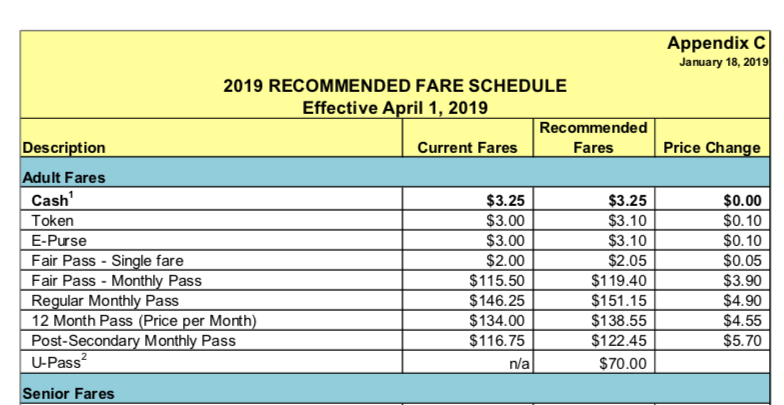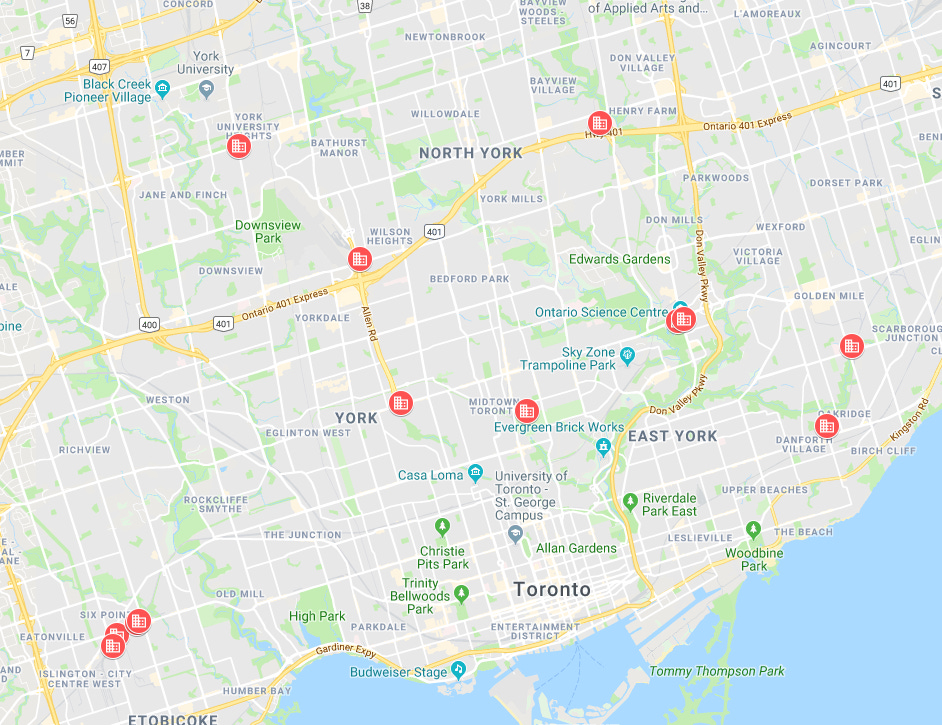City Hall Watcher #2: TTC looks to raise fares, then figure out the rest later
Also: Housing NOW plan a prequel to Housing LATER plan; Toronto's shelters packed over very cold weekend
Follow-up from Issue #1: The Infrastructure & Environment Committee unanimously approved the staff report on the Richmond-Adelaide bike lanes last Thursday. If approved by council on Janury 30, they’ll become permanent.
TTC 2019: A fare hike, a risky budget
The TTC needs more money.
That’s not new information. It’s long been known that the TTC is North America’s least-funded major transit system, receiving operating subsidies well below other cities.
What is new information is the TTC’s strategy to deal with its lack of funds in the near-term. (The long-term, where they’re short about $33 billion in needed capital funds over the next 15 years, is a whole other story — more on that below.) The transit agency’s proposed operating budget for 2019 was released on Friday, and lays out two strategies to deal with its money problems.
TTC Strategy #1: Make Riders Pay More
TTC staff are recommending a fare hike. Again. This isn’t surprising. Mayor John Tory has been consistent since his 2014 election with his belief that transit fares should rise with inflation and service improvements.
Here’s what the recommended adult fares look like for 2019:

If this gets approved by the TTC board this week and City Council is cool with it, all fare types except cash will go up on April 1, 2019.
It’s notable that even the recently-introduced Fair Pass — designed for low-income people — will also see an increase.
The monthly adult transit pass increase proposed works out to a 3.35% increase over current prices, which will almost certainly be larger than the residential property tax increase Tory and a majority of council will support during the coming city budget process.
With that in mind, I made a chart comparing the cumulative cost increases for The Pass Formerly Known As the Metropass and residential property tax increases since Tory took office:

This is an imperfect comparison — an increase to the property tax rate doesn’t mean anyone’s property taxes will go up by that amount, where an increase to the cost of a Metropass does. But it’s still an interesting metric to consider when thinking about council’s priorities.
If you’re of the opinion that transit fares should go up at about the same rate as residential property taxes, taxes for homeowners should go up by at least 2.75% this year so that property taxes match the Metropass’ total increase over the last five years. That would be larger than the increase Tory usually supports.
But if you’re of the opinion that the city should prioritize keeping transit affordable over keeping residential property taxes among the lowest in the GTA then, well, it might be hard to justify any kind of fare increase at all.
TTC Strategy #2: Whatever Man, We’ll Figure It Out Later
Holy hell, this part of the TTC’s 2019 operating budget is nothing short of astounding.
The big problem they start with: even with the fare increase bringing in $25.6 million, $102.1 million in discovered operational savings and an as-yet-unanswered request that council increase the annual transit operating subsidy by $25.3 million, the TTC is still facing a $24 million deficit.
So here’s their plan: they’ll deal with it later.
Seriously, they find the $24 million necessary to balance their budget by writing in an “Undetermined Corporate Reduction” of $24 million. It’s an IOU from the TTC to the TTC — in effect, hinging the entire budget on the hope that somebody, at some point over the next year, opens a random closet and finds a bunch of gold bricks or Renaissance art they can sell.
Even more amazing is that the very same budget document that makes this recommendation also warns that it is very risky:
This strategy places TTC at significant risk of running a deficit in 2019 but was necessary to avoid any reduction to service, limit the required City subsidy increase, and keep the recommended fare increase in line with inflation since the previous fare increase two years ago.
Significant risk! Of Running a deficit!
The coolheaded way to look at this is to acknowledge that, yes, $24 million is not a lot of money in the grand scheme of things, and if the TTC does find itself in deficit later this year, Council would not have to look too hard to find the funds to cover the difference and avoid the short-term need to slash service.
The more alarmist take: even if this strategy works for 2019, it only creates a bigger hole for 2020. This is not a trick you can use again and again. The risk is compounded by the staff-recommended plan to use $15.4 million of the $22.3 million available in the TTC’s Stabilization Reserve Fund this year, taking a big chunk out of the TTC’s rainy day money.
Add that to the city’s other looming budget problems driven by stalled growth of the land transfer tax, and everything starts to look real dark real fast.
Oh, and Also: the TTC Needs $33.5 billion
I’ll let transit guru Steve Munro handle the heavy lifting of detailing the TTC’s Capital Budget documents, but the bottom line is pretty simple: after adding up a bunch of their maintenance and growth needs over the next 15 years, the TTC says it’ll all cost $33.5 billion. The figure includes the early and probably optimistic cost of the Scarborough subway extension, but no other costs related to transit expansion — so the Relief Line would only add to this megafigure.
More than $23 billion is unfunded.
Here’s the need broken down by type of transit, lumping together the TTC’s categories for subways and stations.

Yes, the unfunded amount for the subway lines and stations Premier Doug Ford and the Ontario PCs say they want to “upload” totals $16.2 billion. Good luck to ‘em. This surely aligns with their desire to eliminate the deficit and cut taxes.
Housing NOW-ish
The Executive Committee is set to meet Wednesday for their first significant meeting of the council term. The main event: a report on implementing the mayor’s Housing Now initiative.
The report lays out a plan for the development of 11 city-owned sites for use as rental housing, with 50% of units on each site being designated as affordable rental. By the city’s somewhat controversial definition, that means they’ll go for 80% of Toronto’s average market rent.
To see the sites on a map and follow their development progress, Mark J. Richardson has launched HousingNowTO.com — it’s a fantastic resource. Here’s the map of the sites:

Two things to watch going forward:
This process could make for the basis for a good party game: GUESS THE NIMBY. Which site do you think will receive the most NIMBY pushback? How many times during the course of this process will we hear someone get up and begin by saying, “I am a huge supporter of affordable housing, BUT…”? Take a drink every time someone talks about the unique character of a neighbourhood. Slam a beer every time someone worries about the impact on parking.
The report on Housing NOW concludes by telling us this is only a precursor to a larger 10-year Housing Plan to come later this year. Until it gets a better name, let’s call that plan HOUSING LATER.
More From Matt
This week at CBC Toronto, I’ve got an analysis piece about the ever-mysterious Scarborough Subway. If the Scarborough subway plan was a child it’d be in grade school by now. And yet we know almost nothing about it. Unknowns abound.
In Other News
Speaking of, the Star’s Jennifer Pagliaro asked experts if there’s any real possibility Premier Ford will be able to get the private sector to pay for the Scarborough Subway. I won’t spoil the conclusion, but here’s a hint: one expert says, of Ford’s plans, “someone must have bought some of that new green stuff … That won’t work.”
CBC’s Michael Smee reports from Regent Park Aquatic Centre, a facility so beloved and popular that Regent Park residents are having a hard time getting spaces in lessons and other programs. Demand sure seems to suggest there’s a need for more public recreation centres like this one.
Some stats from the city’s overnight shelter census, which tracks the number of people using shelters and respite services, over this very, very cold weekend. The numbers are bad all over, but especially for women’s spaces. The city’s women’s shelters were at 99% capacity on Friday, Saturday and Sunday nights. The Sistering women’s drop-in shelter was completely full all weekend, while the Fred Victor women’s respite was close to capacity on Friday and Saturday and at capacity on Sunday.
The Week Ahead
MONDAY: The Civic Appointments Committee met today to discuss which members of the public will get to serve on the boards for Toronto Public Health and the Toronto Public Library. Names will be kept confidential until council approves them.
TUESDAY: The Planning & Housing Committee meets. There’s… literally nothing on the agenda, except for the election of a Vice Chair. It’s unclear why the Housing Now plan couldn’t be considered here.
WEDNESDAY: The Executive Committee meets to talk about the Housing Now plan.
THURSDAY: The TTC board meets at to consider their 2019 budgets, while the Toronto Police Services Board holds a meeting to discuss an agenda that has yet to be publicly released.
FRIDAY: No events scheduled. Let’s all hit the pub.
Check the City Council calendar for meeting times and locations.
City Hall Watcher
This has been the second issue of City Hall Watcher. It was long but we got through it together.
This issue was sent out to hundreds of amazing early-adopters for free. Next week’s issue will coincide with the launch of Toronto’s 2019 operating and capital budgets, so look forward to a VERY SPECIAL ISSUE with drama and action and maybe a little romance? No. Wait. I’m being told there will be no romance.
Starting with the February 4 issue, City Hall Watcher will cost five bucks a month, or fifty dollars a year — a bargain and a deal. I’ll send out details on next week’s issue on how to pay. It’ll be super easy.
As mentioned last week, I will be offering free subscriptions to journalism school students, aspiring municipal journalists and activists/advocates who work at City Hall but can’t afford a subscription. Someone also suggested I offer free subscriptions to students who are enrolled in urban studies programs and other fields related to cities too. It was a good idea, so I’ll do it. More details in next week’s issue.
Email me at graphicmatt@gmail.com or just respond to this message with tips, questions, concerns or emojis.
Thanks for reading.

